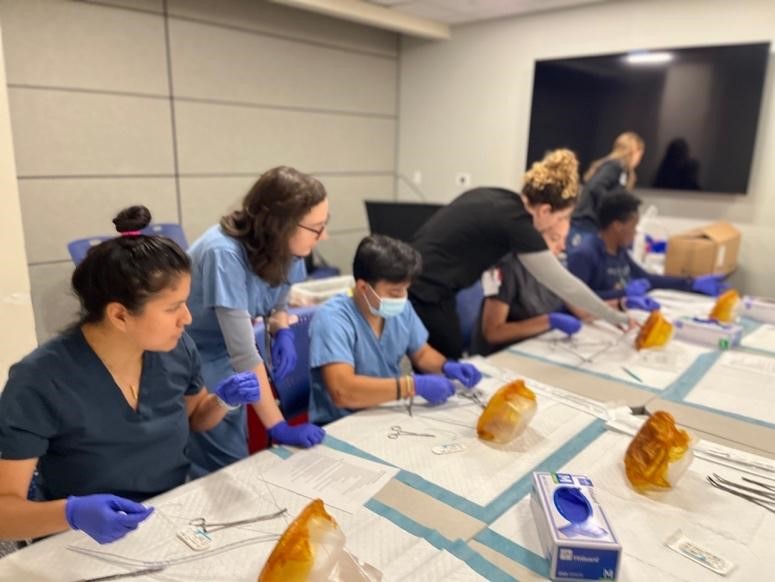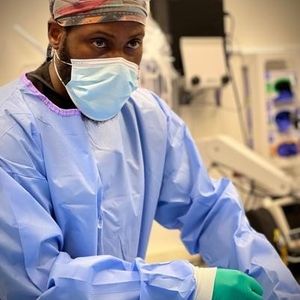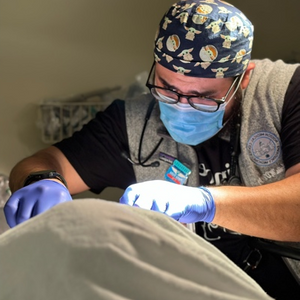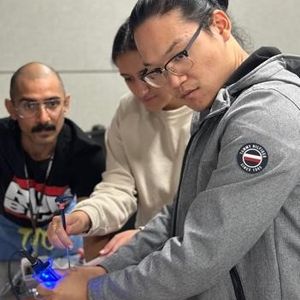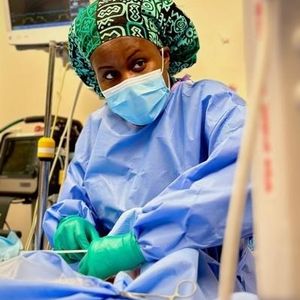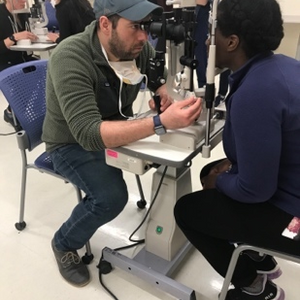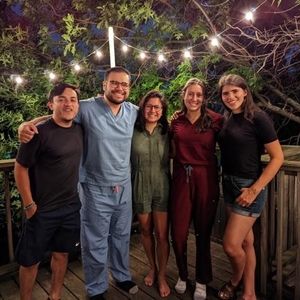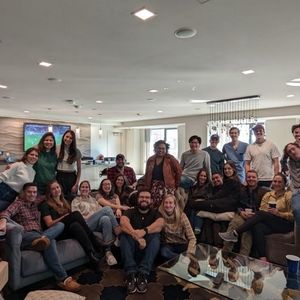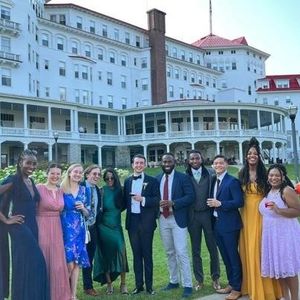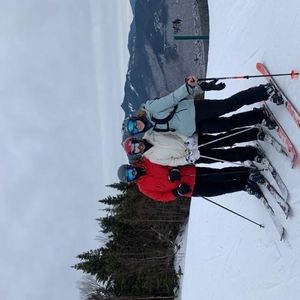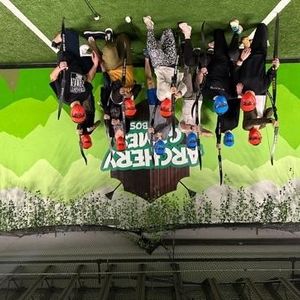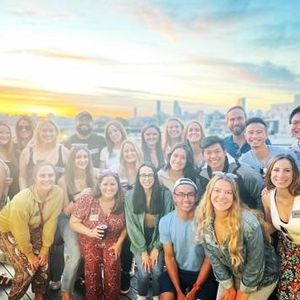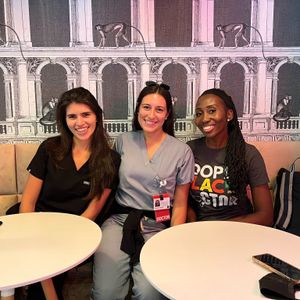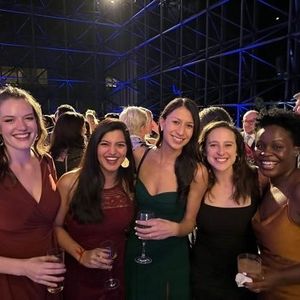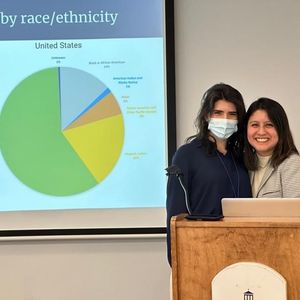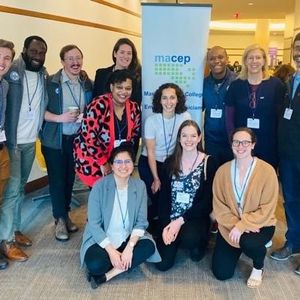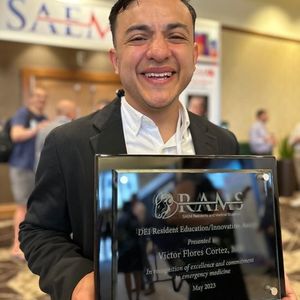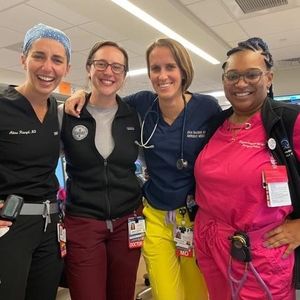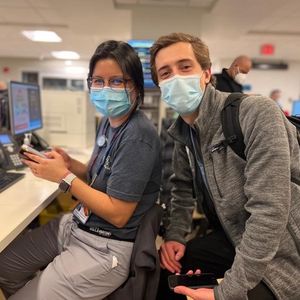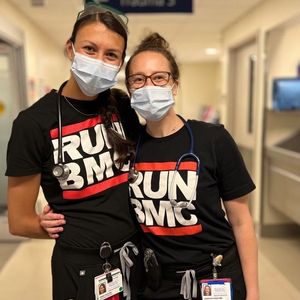Curriculum
Our residency is a four-year (PGY 1-4) program with fourteen residency positions offered each year through the NRMP match. Our curriculum is repeatedly evaluated and refined to provide an academic inquiry environment and challenge residents to develop their clinical, teaching, administrative, and research skills. The residency works within a framework of evidence-based medicine and graduated clinical responsibility. As residents progress through the program, clinical responsibilities reflect their broadening knowledge and experience.
Didactics
Our program hosts didactics for five hours on Wednesday mornings. The lecture curriculum is varied and emphasizes dynamic learning and interactive content. Both faculty and resident leaders devise our lecture curriculum, and the topics/content are frequently evaluated and refined. Evidence-based content and principles are identified and emphasized. Each month one conference day is held in our simulation center with a mix of high-fidelity simulation, hands-on procedural practice, and interactive small groups. Structural drivers of health and concepts of health equity are incorporated into all core content lectures. One monthly conference day is held in our simulation center with a mix of high-fidelity simulation, hands-on procedural practice, and interactive small groups.
Resus University
Our PGY-2 residents are the “Resus Residents” in our department, responsible for all medical resuscitations and major procedures. Each July we hold a month-long boot camp called “Resus University” for the PGY-2 class to prepare them for this role. This month features advanced procedural workshops, simulation sessions, team communication training, and structured clinical shifts with senior residents serving and near-peer mentors.
Wellness
As a program, we believe an important part of resident wellness is fostering a sense of agency and autonomy within the clinical learning environment. It also involves intentionally building a sense of community. Residents are highly engaged in all levels of our program and changes are continuously made based on their feedback and priorities. Community building begins on day one as our interns are quickly welcomed through a residency big sib/family system and through pairing with a nursing buddy to orient them to the department. We also create space for our residents to gather to foster friendships throughout the year. This includes dedicated days each year for class-specific retreats, an end-of-intern-year weeklong retreat, as well as numerous social events throughout the year. Finally, because the health of our residents is a priority, all new BMC interns are assigned a primary care doctor during intern orientation and are connected with mental health resources.
Scholarship
Our residents have a history of academic success and pursue scholarship within multiple academic divisions. Our residents fulfill the ACGME scholarship requirement through publications, presentations at national meetings, and leadership on national committees. BMC has a high level of expectation for our residents. Our graduates leave with the skills and confidence necessary to become leaders in the field of EM.
Clinical Model
Our clinical training model works within the framework of graduated clinical responsibility. Each year is intentionally designed around specific skillsets and roles within the department.
PGY1
Intern year training establishes a foundation in emergency medicine principles and management of common complaints. Interns learn to approach the undifferentiated patient, and to devise and execute their own management plans, within the construct of the treatment team. Interns are introduced to the management of critically ill patients in the trauma room, and progressively develop their multipatient management skills throughout that first year.
- Orientation: 1 week
- BMC ED: 26 weeks
- Good Samaritan ED: 4 weeks
- Pedi ED: 4 weeks
- Ultrasound: 4 weeks
- SICU: 2 weeks
- MICU: 4 weeks
- Obstetrics: 4 weeks
- EMS/Ophthalmology/Orthopedics: 4 weeks
- Vacation: 4 weeks
- Intern Retreat: 1 week
PGY2
PGY2 year is structured for learners to master procedural skills, and to learn to run a code, to lead a medical resuscitation. Coined the “Resus Resident” (aka “The Procedure Residents”), our PGY2 has first priority for all procedures completed in the department, utilizing the principles of deliberate practice and spaced repetition to develop expertise. The PGY2s are code leaders for every medical patient ill enough to require our ‘trauma rooms’. PGY2s broaden their educational experience by rotating in the ED’s of our three affiliate hospitals: Boston Children’s Hospital, Lahey Medical Center, and St. Elizabeth’s Medical Center. In addition, all PGY2s receive time off and are funded to attend the annual Society for Academic Emergency Medicine (SAEM) conference each spring.
- Advanced ED Skills: 4 weeks
- BMC ED: 16 weeks
- Anesthesia: 4 weeks
- Children’s PICU: 4 weeks
- Lahey ED: 4 weeks
- St. Elizabeth ED: 4 weeks
- CCU: 4 weeks
- Neuro Critical Care: 4 weeks
- Elective: 4 weeks
- Vacation: 4 weeks
PGY3
PGY3 year is our program’s most rigorous year of training as residents move into supervisory roles. Our PGY3s serve as the ‘A side senior’, overseeing the care provided to all the patients on one side of our ED, taking presentations from students and juniors, and developing department management skills that are imperative to independent practice in emergency medicine. On separate shifts, our PGY3s also serve as the ‘Trauma Resident’, supervising the care of critically injured patients presenting to the ED, coordinating care with consultants, managing every airway and intubation we perform in the ED. Because of BMC’s affiliation with Boston EMS, PGY3s provide on-line medical control for all 911 calls in the City of Boston through the regional Central Medical Emergency Direction (CMED) radio system.
- BMC ED: 28 weeks
- MICU: 4 weeks
- Elective: 8 weeks
- Vacation: 4 weeks
- Good Samaritan ED: 4 weeks
- Children’s ED: 4 weeks
PGY4
PGY4 provides an opportunity to refine clinical skills of oversight, supervision and multipatient management, alongside advanced training in pediatric EM and toxicology. That plus elective opportunities make the PGY4 year a favorite for many of our trainees. In addition, all PGY4s receive time off and are funded to attend the annual American College of Emergency Medicine (ACEP) conference each fall.
- BMC ED: 24 weeks
- Teaching Advanced ED Skills: 4 weeks
- Toxicology/Simulation: 4 weeks
- Children’s ED: 4 weeks
- Lahey ED: 4 weeks
- Elective: 8 weeks
- Vacation: 4 weeks
